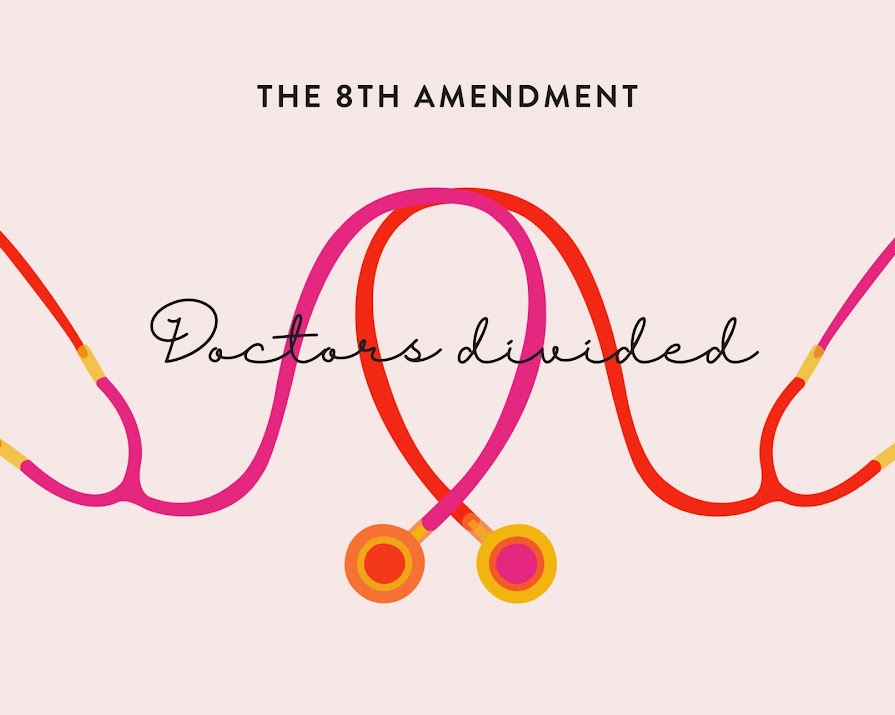
By Amanda Cassidy
07th May 2018
07th May 2018
The Eighth Amendment and the termination of pregnancy are emotive issues that affect everyone in the country in some shape or form. Both sides of the debate offer opposing views as to how a change to the Constitution might impact both patients as well as medical practitioners. Amanda Cassidy speaks to GPs, clinicians and those in the healthcare industry to get their view on what should happen on the 25th.
“I would prefer to stop practising medicine than be involved in destroying the life of a child.” Dr Kirsten Fuller is a GP in South Tipperary. She has been a local family GP for over 17 years and believes that when a pregnant woman arrives at her surgery, she sees and treats two patients.
“Two basic principles have always guided me; the first is to do no intentional harm and the second is to practice medicine based on scientific evidence. These principles have always made me proud to practice medicine here. Ireland is one of the safest countries in the world for children to be born. The law currently allows doctors to intervene if a woman’s life is at risk – that’s our obligation under Medical Council guidelines.”
Dr Fuller says that abortion is simply not healthcare.
“Abortion is not a medical treatment, it is not a cure for anything. It is the deliberate ending of a child’s life. As a GP, I find it abhorrent to think that the government expects me to provide a service to end a life. The proposals specify unrestricted abortion up to 12 weeks. This isn’t about sick women. How can any doctor be comfortable with that? I had a patient who got pregnant after rape, the only case I’ve ever had in 17 years of practice. She was so vulnerable at the time and didn’t want to have an abortion. She required a huge amount of support and I was able to offer her that. I visited her in hospital, and seeing her smiling at her little newborn girl was overwhelming and something that has always stayed with me. We valued the life of that baby and the mum found a great deal of peace in that.”
“Abortion is not a quick fix, the problem doesn’t go away the day a baby is terminated. Many women grieve for the rest of their lives.”
Dr Fuller says that people just assume that a doctor who doesn’t want to be involved in abortion (if the Eighth Amendment is repealed) can just opt out.
“The Minister for Health announced that this would be a GP-led service if it is repealed, but he never even consulted with GPs. The Heads of Bill say that if a GP has a conscious objection they can transfer care to another doctor – but I don’t want to be complicit in any of this, at any level. We will lose doctors over this and it will change the face of medicine in Ireland. We will see abortion clinics opening up to ease the pressure on GP surgeries. The government has been too vague on facts. Abortion pills are only used up to about eight or nine weeks, what then? I won’t be a part of it. I would prefer to stop practising than have any involvement in abortion.”
A grey area
In 1983, the Eighth Amendment was passed by the Irish electorate. It acknowledges the right to life of the unborn with equal regard to the right to life of the mother. Including it in our Constitution meant a ban on abortion ever being legalised in Ireland, ensuring that changes to the legal status of termination would always have to be put to the people rather than through the Government. But some fear that although abortions are allowed legally in cases where the mother’s life is in danger, there is a lack of clarity for practitioners when it comes to what is and isn’t allowed.
Professor Richard Green has been working in obstetrics and gynaecology for nearly 30 years. He outlined some of the situations he is faced with in his day to day working life during a Fine Gael Yes campaign speech.
“A woman, let’s call her Nancy, presented with an ectopic pregnancy, in which the foetus was outside the uterus and unviable. She was also showing signs of bleeding which put her life at risk. We discuss it with Nancy and her partner. The decision is made to treat her surgically and remove the pregnancy. There is a heartbeat but they accept that it is the appropriate treatment and it meets all the legal requirements. However, I leave her and I am called to come back and counsel her again because she overhears a conversation where one staff member says to the other, ‘Is this legal, the baby’s heart is still beating?’ So the correct choice of care is being questioned because of the Eighth Amendment.”
Dr Greene also described the case of a woman called Sheila who presented at 13-14 weeks pregnant with her cervix already open in a pregnancy that she had really wanted. “Sheila’s water bag around the baby had gone, the chance that this baby would survive is about one or two in 1,000. The chances of that baby’s lungs developing are limited and the risk of infection is very significant and we have to achieve another 10 weeks of pregnancy to get her to a viable gestation. But I have to actually wait until her life is at risk to do what I know is an appropriate treatment. Yes, the 2013 Protection Of Life in Pregnancy Act will allow me to act once her life is in danger but effectively the Eighth Amendment is dictating a tardiness for both Sheila and myself.”
Dr Siobhan Donohue is a family GP who herself had to travel to the UK when her son TJ was diagnosed with anencephaly during her pregnancy. She says the bottom line is about caring for the patient in front of you.
“GPs are usually the first point of contact when people find out they are pregnant. They are ideally placed to care for people regardless of whether they choose to continue a pregnancy or not. It’s estimated that if every GP in the country (about 2,500 of them) provided abortion care they would see around two cases a year each. If 100 GPs provided abortion care they would each see around one case a fortnight.
Many GPs are seeing these cases anyway, but currently, they can not provide the care their patients need.
If we vote yes and remove the Eighth Amendment the vast majority of pregnancies in Ireland will still proceed to term. It will just mean that doctors will be able to provide care for all their patients.”
A matter of life or death?
There is a legitimate moral debate to be had about abortion. It is happening in houses all over the country. A respectful conversation that puts the responsibility in the hands of Irish women and men. However, shouldn’t an individual GP’s right to conscientious objection be absolute? How can that be balanced against the patient’s competing rights, particularly the right to life in the case of a medical emergency?
Professor Eamon McGuinness is a consultant obstetrician and gynaecologist. He says medical myths and misinformation need to be dispelled. He believes that there is a deliberate miscommunication of the facts when it comes to things like cancer treatment for pregnant mothers. “My colleagues in Ireland in oncology practice tell me they have always been able to achieve an optimal cancer treatment for the mother without the need to forgo the life of the child. There is no question of women being denied life-saving cancer treatment because of the amendment.”
Perspective
But the argument about a lack of clarity needs to be thrashed out. Even the European Court of Human Rights said it had concerns about the “effectiveness of the consultation procedure [between a woman and her doctor] as a means of establishing…qualification for a lawful abortion in Ireland”. It said that while the constitutional provision (as interpreted by the Supreme Court in the X Case) allows for certain lawful abortions, the fact that they have never been legislated for means that “absolute prohibition” and “associated serious criminal offences” remain in force and contribute to the “lack of certainty” for a woman and her doctors.
If the Eighth Amendment is repealed it means that the legislation will be determined by the Oireachtas. As part of the proposed law, unrestricted abortion will be allowed up to 12 weeks, and in the case where a woman’s life, health or mental health is at risk, two doctors – a gynaecologist and a doctor with a speciality in the area concerned will determine that risk after 12 weeks of pregnancy. No distinction will be made between health or mental health. This mirrors the current Protection of Life During Pregnancy Act.
The proposed laws also commit to the decriminalisation of abortion but will allow for doctors to be penalised. This will include jail sentences up to 14 years if a medical professional carries out a termination outside of the current law.
The Front Line
Ireland has never voted on whether abortion should be introduced in the State. We’ve voted on the right to travel, the right to information and whether or not to repeal the Supreme Court judgement in order to disqualify the risk of suicide as a grounds for an abortion.
This is a vote that will affect everyone in the country. Naturally, the debate has revolved around whether 12 weeks is too much or if we can trust our politicians. It has become about shocking posters outside Holles Street and about which campaign can shout (or shock) the loudest. May 25th will be a big day for this country – the results will represent an evolution of thought or a nation that prefers to keep things as they are. Either way, those on the front line of this – the patients and the doctors who are treating them – will feel the biggest impact once the people of Ireland have had their say.























